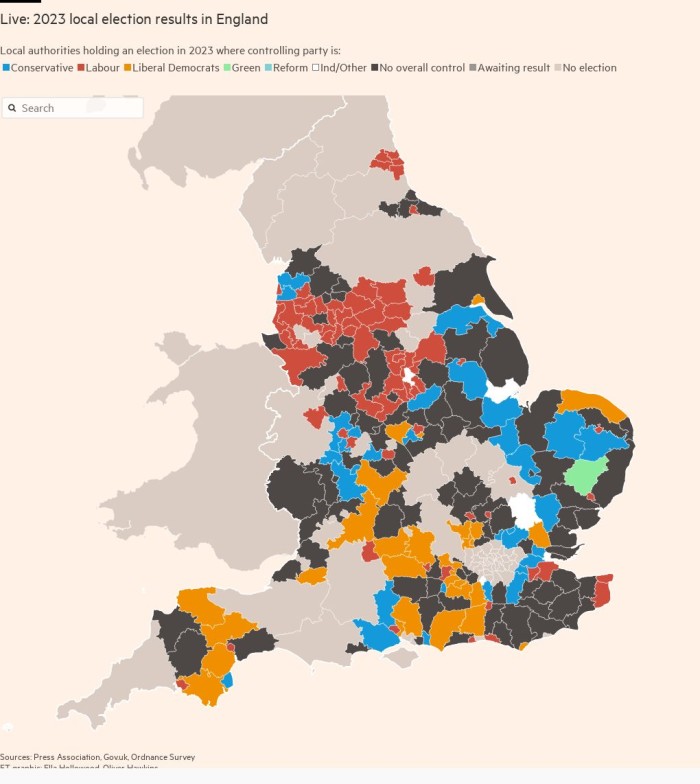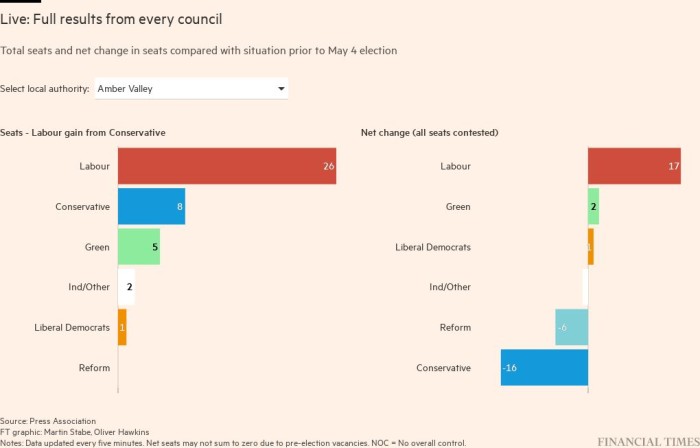[ad_1]
Rishi Sunak’s Conservatives on Friday faced crushing losses in UK local elections as voters in many parts of England turned against the party after a tumultuous year.
The prime minister woke up to news that his party was on the ropes, with Labour making inroads in the north and Midlands and the Liberal Democrats advancing in rich areas of the south.
Early results suggested the Conservatives could lose as many as 1,000 council seats compared with their standing before the elections, matching some of the party’s most pessimistic predictions.
But overnight counting only took place in about a quarter of the 8,000 seats up for grabs, and Sunak and his rivals will have to wait for a fuller picture to emerge on Friday afternoon.
Labour took control of Medway Council in Kent, seizing it from the Tories for the first time in 20 years. The party also took control of south-west England’s Plymouth City Council, along with Stoke-on-Trent, part of the former “red wall” which fell to Boris Johnson’s Tories at the 2019 election.

Labour said the party was making gains in the kinds of seats it needed to win back at a general election expected next year. “These results show that we are on course for a majority Labour government,” said Shabana Mahmood, Labour’s campaign chief.
But the early results suggest that Labour leader Sir Keir Starmer still has work to do to be confident in winning an outright majority at the next general election — the gains were shared with Lib Dems and the Greens.
Conservatives lost overall control in a number of other councils, including Brentwood in Essex, Tamworth in Staffordshire, Hertsmere in Hertfordshire, East Lindsey in Lincolnshire and North West Leicestershire.
Liberal Democrat leader Sir Ed Davey said the results had given him a “Cheshire cat” smile and claimed his party was advancing across the country. He said the Lib Dems had taken control of Windsor and Maidenhead council, the area represented by former prime minister Theresa May.
By midday on Friday, Labour had gained 143 seats compared with its position immediately before the elections, while the Lib Dems had gained 60 and the Conservatives had lost 195.

Sunak said voters had made it clear that they wanted him to focus on their priorities — the economy, NHS and immigration — but insisted the Tories had made progress in limited areas such as Peterborough.
Greg Hands, Tory chair, said: “We always said it would be a difficult night for us, and that’s turned out to be the case. It has been a disappointing night for the party and the government.”
Polling expert Sir John Curtice wrote on the BBC website that it was possible the Conservatives would reach the threshold of 1,000 seat losses but added the gains were being more evenly divided than expected between Labour and the Lib Dems.
“Labour will be disappointed that it looks as though their vote is simply on a par with their performance in last year’s local elections, although the Conservatives are still five points down on 12 months ago,” Curtice wrote.
Since the last set of local elections, the Tories have had three prime ministers — Johnson, Liz Truss and Sunak — and have presided over a period of political and economic chaos.

The local elections are likely to be the last big test of public opinion at the ballot box before the general election, expected in the summer or autumn of 2024.
Elections for the wards being contested on Thursday were last held in 2019, when the Conservatives under May and Labour under Jeremy Corbyn both did poorly.
Curtice has said Labour needs a double-digit vote-share lead in the elections to be sure of a parliamentary majority at the general election.
“On the results declared so far, we are confident Labour will have an equivalent vote share lead of at least eight points which would represent our best result since 1997,” a Labour spokesperson said.
Data and graphics by Oliver Hawkins, Ella Hollowood and Martin Stabe
[ad_2]
Source link
